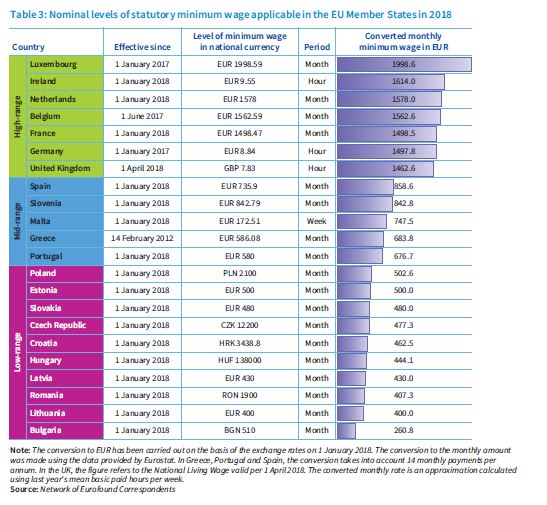Statutory Minimum Wages Throughout Europe
Thursday 19 April, 2018 Written by Fric, Karel, Eurofound/Simon Collyer
Increases to minimum wages have gathered pace since 2010, with the highest increases recorded in countries which had the lowest minimum wages. However, a large gap remains with minimum wage workers in Bulgaria, the country with the lowest statutory minimum wage, earning just one-eighth the salary of minimum wages workers in Luxembourg, which has the highest rate.
The term ‘minimum wage’ refers to the various legal restrictions governing the lowest rate payable by employers to workers, regulated by formal laws or statutes. This report provides information on statutory minimum wages that are generally applicable in a country and not limited to specific sectors, occupations or groups of employees. While the scope of the report covers all 28 EU Member States, the main findings relate to the 22 countries that had a statutory minimum wage in place in 2018.
In most of the countries, the social partners have been involved in the setting of the minimum wage in 2018 – in marked contrast to the beginning of the decade when minimum wage-setting was characterized by strong government intervention. While the highest increases in the minimum wage were recorded (in nominal and real terms) in Bulgaria and Romania, both countries – as well as several others – have a long way to go to catch up with the minimum wage levels prevailing in western European countries.
This graph explains why so many people in the EU, the Polish, for example, want to come and live and work in the UK. However, with the value of the pound falling due to BREXIT this is making it less attractive. The pound is now 1 GBP =1.14728EUR. The pound is buying fewer Euros as it falls making imports more expensive. To buy overseas goods and services you have of course to exchange your currency, by buying the currency of the country where the goods you want are produced.
Of course, with inflation rising (though it has fallen slightly recently) living in the UK will feel expensive. Then you have the cost of traveling and living before finding work. In time, these wage disparities will potentially even out, as former Eastern Bloc countries develop their economies and become better customers too. That needs spending on infrastructure by the EU which is in progress.
Economics will continue to play a major factor in immigration. Most UK immigration is from outside the EU.
ABC Note: The Eurofound minimum wages report is attatched below:
Leave a comment
Make sure you enter all the required information, indicated by an asterisk (*). HTML code is not allowed.
Join
FREE
Here











